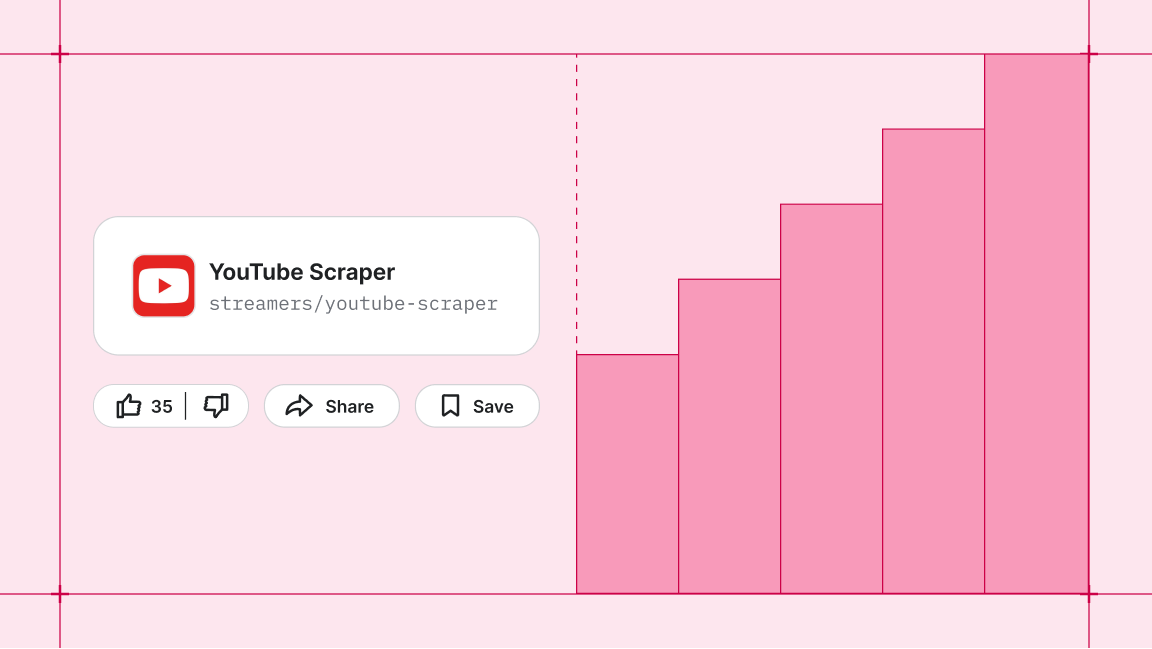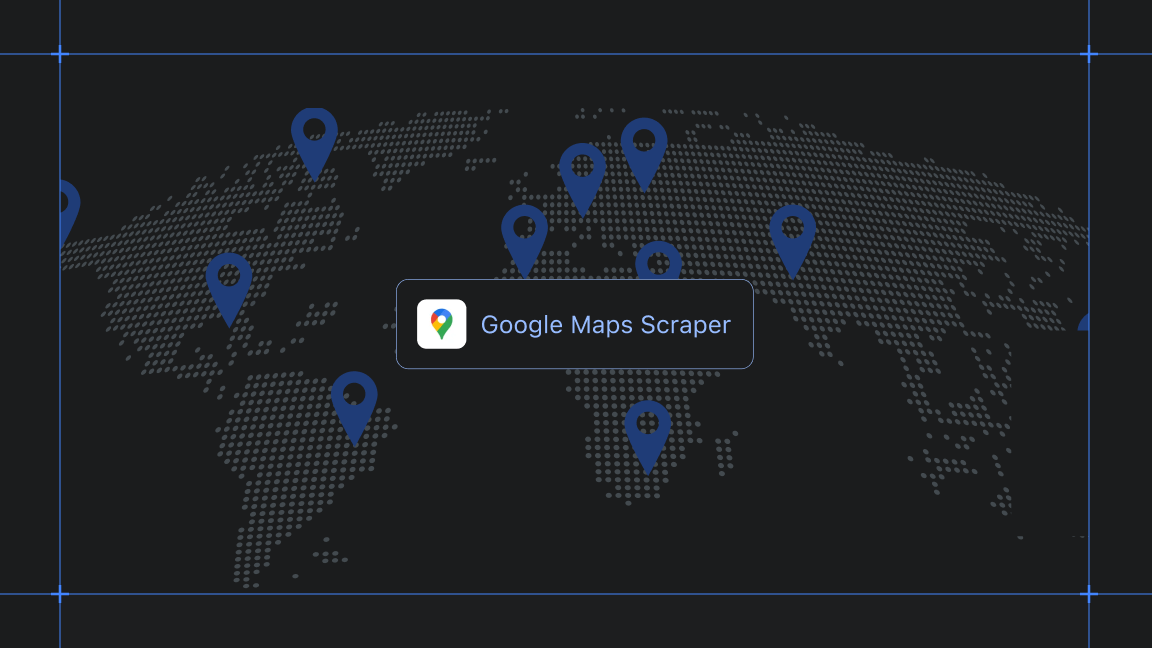Businesses today are surrounded by potential data - customer interactions, product reviews, competitor activity, market trends - but struggle to collect and use it effectively. The challenge isn’t a lack of information, but the difficulty of turning scattered, messy, or hidden data into valuable insights.
Without an automated data collection solution in place, you might have tried collecting information manually, overloading your IT team with ad hoc requests, or using outdated datasets from sporadic exports. All of these are slow, error-prone, and impossible to scale.
Apify Store is an answer to the data acquisition challenge. If you want to automate your processes without building complex scrapers or APIs from scratch, the Apify marketplace can provide you with deployable automation bots and agents (Actors) capable of crawling, parsing, and structuring web data. The data collected from Actors can be integrated into orchestration tools, data pipelines, or custom workflows.
Why does Apify Store matter in 2025?
Apify Store provides specialized tools for data acquisition. These tools not only save time and reduce costs, but also make data collection both manageable and easy to integrate with analytics platforms, AI tools, and other third-party systems. Here’s why it matters.
- Your business needs live data. Actors run entirely in the cloud, meaning they can operate 24/7 without local infrastructure. They can scrape websites on a schedule or in real time, so instead of a snapshot, you get constantly updated data.
- Building scrapers in-house is not an easy task. Websites are becoming more complex, so it's getting harder to scrape sites with JavaScript-rendered pages, CAPTCHAs, and bot detection - plus, anti-scraping measures and page layouts are changing regularly. Apify’s infrastructure is built to handle these issues. Moreover, in a marketplace model, creators maintain their scrapers, so you don’t have to worry about updates and can run your bots without interruptions.
- Public data access. Web scrapers access websites the same way as a human user would. They access only data that’s publicly available.
- Specialized solutions match your needs. Scraping tasks look completely different for marketing, e-commerce, SEO teams, or business researchers. A marketplace that hosts niche, industry-specific scrapers built by experts is something generic scraping tools can’t match.
Apify Store helps organizations build their domain-specific data collection strategies and adapt them to the evolving markets, platforms, and customer behaviors.
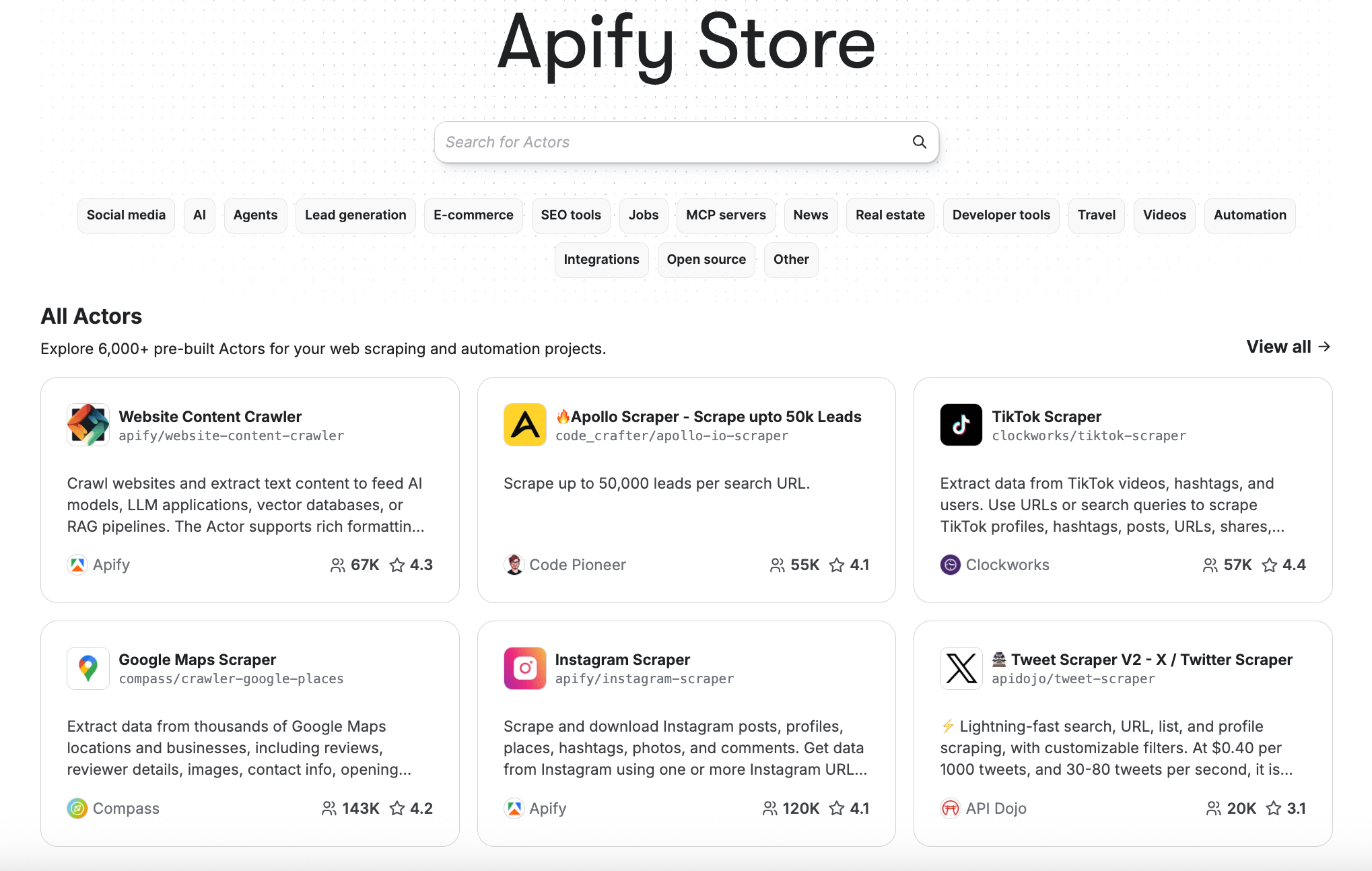
How Apify Store works
Apify Store is where you go to find, run, and scale web automation tools - especially if you need fresh, structured data to feed into AI systems, analytics dashboards, or competitive intelligence platforms. Apify Store offers more than 6,000 pre‑built scrapers - called Actors - and its offer keeps growing.
Actors in the store are either created and maintained by Apify or community members. You can search for Actors by name, service type, or author. Alternatively, you can explore Actors grouped under predefined categories below the search box, e.g., social media or e-commerce. You can also organize the results from the store by different criteria, including pricing model or developer type.
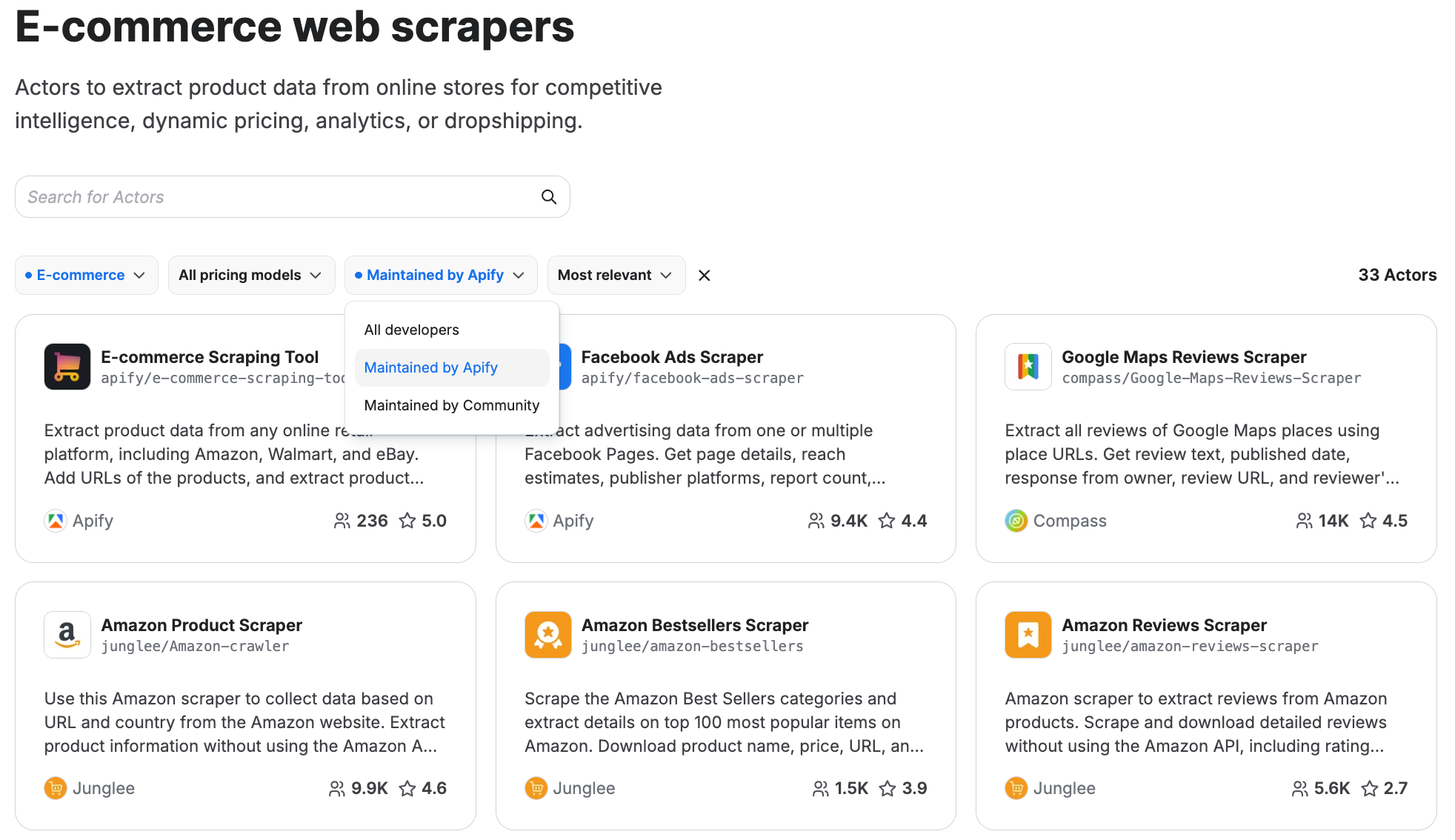
Once you select an Actor from the store, you'll be directed to its specific page. Here, you can configure the settings for your future Actor run, get your results, and export them in a preferred format.
What exactly is an Apify Actor?
Actors are serverless programs packaged as containers that run in the cloud. They're called Actors because, like human actors, they perform actions based on a script. They scale from simple tasks such as filling out a web form to complex operations such as crawling an entire website. They integrate easily with APIs, databases, and AI models.
Apify Actors are:
- cloud-native. Actors run entirely on Apify’s managed infrastructure - without server setup, proxy management, or scaling headaches.
- reusable and shareable. You can keep your Actors for yourself, share Actors privately with your team, or publish in the Apify Store for global access.
- configurable via input schema. Based on the input schema, the Apify platform automatically generates a user interface for the Actor (keywords, URLs, filters), so users can tweak behavior easily, without code.
- able to provide structured outputs. You can get your results in JSON, CSV, or Excel - all ready to feed into analytics dashboards, CRM systems, or AI pipelines.
- ready to tackle CAPTCHAs and anti-bot challenges. Apify Store scrapers have proxy rotation, browser fingerprinting, and CAPTCHA-solving built in.
- easy to scale. Actors can handle anything from a quick single-page scrape to multi-million-page crawls with parallel runs.
- specialized. Each Actor was designed by experts to handle a specific task.
- ready for scheduling and automation. Actors can be set to run on a recurring schedule (daily, hourly) or triggered programmatically via API.
- integration-ready. You can easily connect the Apify platform and Actors with web apps and cloud services.
- constantly updated. New versions can be pushed without breaking existing integrations or workflows. Store users automatically get the latest fixes.
- easy to analyze. You can track run counts, execution time, and error rates to measure performance and ROI.
What else can Actors do?
Actors can do more than web scraping. You can use them to automate your processes, monitor for changes on the web, or utilize LLMs. Here are some examples:
- Page rendering with headless browsers. Loading, executing, and visually building a web page in a real browser, so you can interact with the final, fully loaded DOM for scraping, automation, or testing.
- Task automation to fill out forms, click buttons, or simulate user behavior for testing or data entry.
- Sites monitoring, if you want to keep an eye on content changes, new listings, or price fluctuations.
- Crawling large site structures with spidering crawlers able to extract data across thousands of pages.
- AI agents and LLM pipelines. A growing number of Actors use GPT-style models to interpret, summarize, or act on scraped data, enabling more autonomous and context-aware automations.
Apify Store as an AI enabler
AI tools have become a baseline expectation in many industries, especially those where large amounts of data, automation, or predictive insights are key. However, it’s important to note that LLMs (such as ChatGPT, Claude, or Gemini) trained last year can’t know what’s happening today unless you feed them real-time inputs. Plus, if you want to use them for data collection, they can’t natively browse complex or dynamically rendered websites reliably.
If you want to train your own LLM, Apify Actors can provide you with structured JSON files ready for model ingestion. Website Content Crawler is a great example of an Actor able to not only crawl entire websites but also eliminate irrelevant information, remove duplicates, and provide you with data to feed, fine-tune, or train your large language models.
Apify Store also offers AI agents - Actors that demonstrate autonomy in achieving specific goals. They utilize LLMs and potentially other Actors or external systems to reason about a task, plan it, and execute it. An AI agent on Apify might, for example, trigger multiple Actors, process the results, and determine the next steps based on the findings.
How to run Apify Actors?
Apify gives you multiple ways to trigger and manage Actors, depending on your workflow. You can use a ready-to-go solution directly in Apify Console, or run Actors locally.
| Method | Description |
|---|---|
| Apify Console | The Apify platform lets you run Actors manually, configure input parameters, and watch their live logs in real time. No code needed. |
| REST API | Actors can be invoked using the Apify API by sending an HTTP POST request to the Run Actor endpoint. Take a look at the API Reference for details. |
| Webhooks | Webhooks allow you to configure the Apify platform to perform an action when a certain system event occurs. For example, you can use them to start another Actor when the current run finishes, to chain a process together. |
| Apify CLI & GitHub Actions for CI/CD pipelines | Developers can run Actors locally, deploy changes, and trigger runs as part of automated workflows. It’s a great solution for keeping automation scripts up-to-date and fully integrated into your DevOps cycle. |
Running an Actor from Apify Console is a straightforward process requiring no coding skills, and you can try any Actor for free. The process is fairly straightforward:
- Choose an Actor from Apify Store to try it for free.
- Fill out the information in the Input tab, such as URLs you want to scrape, and any other details you need.
- Run your Actor by clicking Start.
- Get the results. You can export the dataset in various formats, such as JSON, CSV, or Excel.
Actor integration and workflow orchestration
Beyond simple execution, Apify Actors are powerful building blocks that you can chain and orchestrate - either via Apify Console’s Actor-to-Actor integrations (with triggers like run-succeeded), through direct SDK calls (Actor.start() , Actor.call()), or even via the Metamorph feature to transform one Actor into another during execution. You can also operate Actors in Standby mode, so they act like real-time APIs, ideal for low-latency event-driven tasks. Actors also connect to other actors. Actors also connect to other Actors.
For real-time scenarios, Actors can be triggered by business events - such as inventory updates, competitor price changes, or new product launches - using message queues or cloud-native services.
You can choose the integration method that best fits your existing technology stack and business processes.
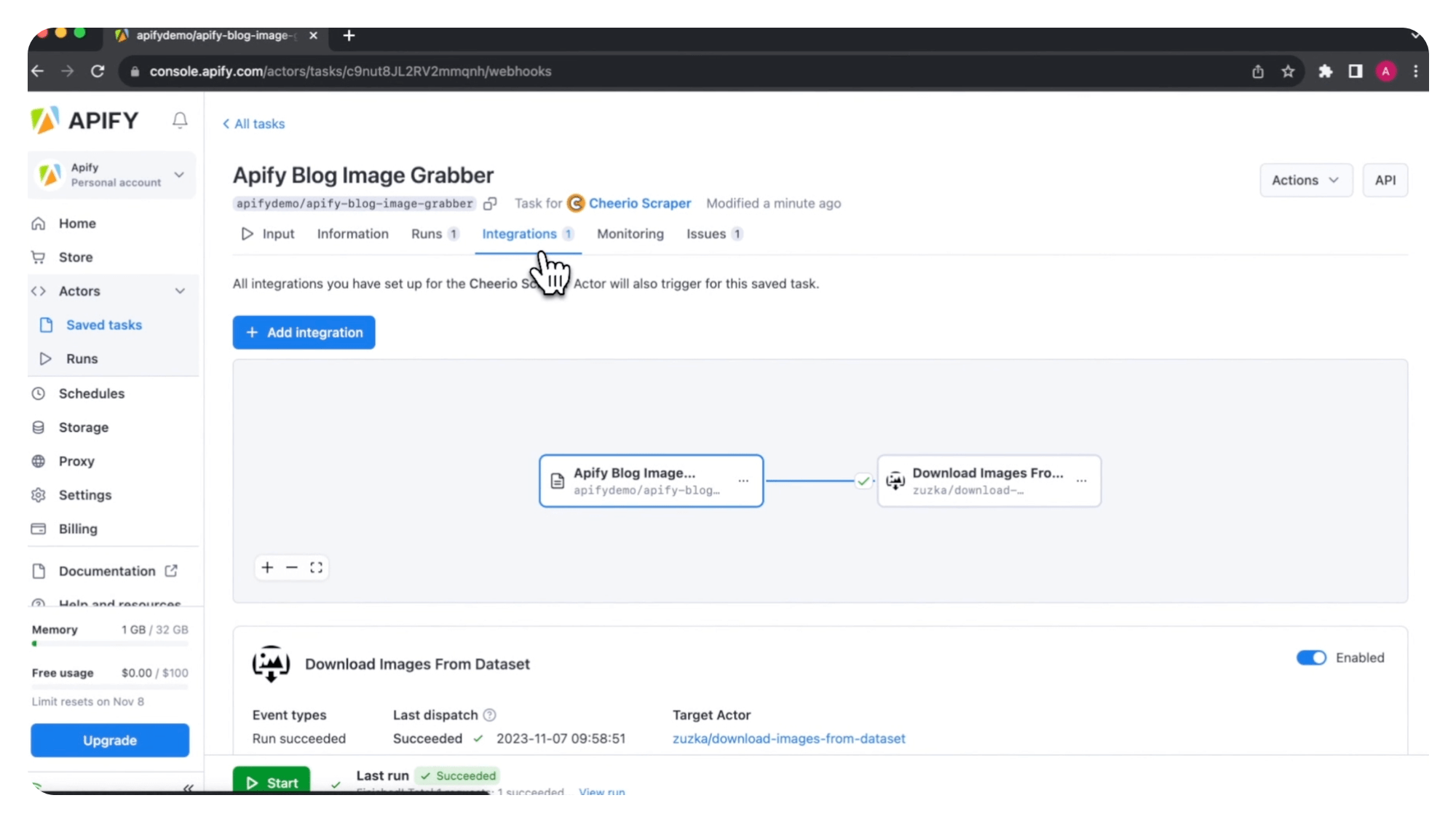
Creating your own Actor
What if you haven’t found a perfect Actor for your needs? You can build your own tailored solution directly in Apify Console to match your unique use case. There are two paths you can take to create and publish your own Actor:
- Using code templates, which can be used either in Apify's Web IDE for browser-based development or downloaded locally through the CLI for traditional IDE workflows. The Web IDE requires no setup and lets you start coding immediately, while the local approach gives you access to your own development tools and debugging environment.
- Using your existing source code from the GitHub, GitLab, or Bitbucket repository through the Git repository integration. Make sure your code follows the Apify Actor structure with proper input handling and data output.
Your Actor can stay private, visible only to you and the people you decide to share it with, or you might want to follow other creators and monetize your project by publishing it on Apify Store.
Publishing and monetization
If you want your Actor to become available for all Apify Store users, you can easily do so. Once your Actor is store-ready (tested, named, and with all key information such as README.md included), you can simply publish the Actor to the store with a single click.

Public Actors can be either free or monetized. Paid Actors let you earn passive income while making Apify Store’s offerings more diverse and up to date. If your solution gains popularity with users, you could follow in the footsteps of the most successful independent creators on the marketplace, who earn over $2,000 in monthly recurring revenue.
Developers can offer their Actors to a global audience with one of the following pricing models:
- Pay per event (PPE): Users pay for actions performed, not the results obtained. For example, a scraper that charges $5 per run start and $2 per 1,000 results would cost $15 for 5,000 results. Apify offers $5 of credit to all users, and that amount renews monthly, so everyone can test scrapers without financial commitment.
- Rental: You specify a free trial period and a monthly rental price.
- Pay per result (PPR): Users are charged based on the number of results your Actor produces and stores in the run's default dataset.
With flexible monetization models and a global user base, Apify Store makes it easy for developers to reach thousands of potential customers.
Try Apify Store for free or start building
Now’s the time to head to Apify Store and start exploring! Choose a scraper based on your needs - you can easily search for one using any keyword (for example, Instagram, Google Maps, TikTok, Amazon, etc.), and test it without any financial commitment.
Ready to build your own Actor? We have a bunch of resources for developers:




